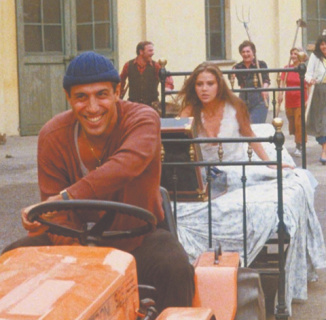
From the working-class streets of Milan, Adriano Celentano emerged not just as a singer, but as a cultural force who defined an era. Known as “Molleggiato” (“The Man on Springs”) for his unique, energetic stage presence, he built a phenomenal career as a singer, songwriter, actor, and director by fiercely guarding his artistic independence. His journey from a humble background to becoming one of the 20th century’s most iconic Italian figures is a testament to a rebellious spirit that refused to be tamed.
A pivotal moment arrived at the prestigious Sanremo Music Festival in 1966. While the event was not expecting any sensations, Celentano captivated the nation with “Il ragazzo della via Gluck” (“The Boy from Gluck Street”). The song was a poignant and deeply personal critique of urbanization and the loss of nature, telling the story of a boy who leaves his green neighborhood for the city, only to find it replaced by concrete upon his return. It was a theme that resonated powerfully across a rapidly industrializing Italy, cementing Celentano’s status as an authentic voice of the people whose appeal transcended social class.
Driven by a desire for total creative control, Celentano established his own record label, “Clan Celentano,” in the early 1960s. It was a revolutionary move, a family-run enterprise staffed by friends and relatives that challenged the established music industry. While his initial business ventures were chaotic, his wife, the actress Claudia Mori, soon took the reins. With shrewd intuition, she masterminded his public image, crafting a signature style of mismatched clothes and a perpetually unbuttoned shirt. This calculated “anti-fashion” statement became a core part of his brand, transforming him into an unforgettable and rebellious icon.
Celentano seamlessly translated his charismatic persona to the silver screen, becoming one of Italy’s most bankable movie stars. He played a wide range of characters, from brooding misogynists to charming aristocrats, but he excelled as the cunning, quick-witted rogue. The 1976 hit film “Bluff” perfectly encapsulated this archetype, with Celentano starring as a brilliant con artist. His on-screen characters often mirrored the personas in his songs: a blend of naivety and wisdom, simplicity and cunning. This relatable “everyman” hero, who always outsmarted the powerful, was a key reason for his immense popularity both at home and abroad.
His influence extended far beyond Italy’s borders, reaching a fever pitch in an unlikely place: the Soviet Union. For millions living behind the Iron Curtain, Celentano represented a vibrant, charismatic, and free-spirited West. His 1987 concerts in Moscow were a landmark cultural event, drawing hundreds of thousands of fans and demonstrating the unique power of his appeal. Unlike polished Western pop stars, his perceived sincerity and raw energy offered a form of accessible rebellion and joy, making him a beloved figure across geopolitical divides.
Even as musical tastes evolved, Celentano proved his remarkable staying power. He reinvented himself with successful television shows, released comeback albums to critical acclaim, and periodically retreated from public life only to return with renewed vigor. His final major concerts in 2012 at the historic Arena di Verona were a triumphant celebration of a six-decade career, met with rapturous applause. The boy from Gluck Street had become a global phenomenon, leaving a legacy not just of hit songs and films, but of a fiercely independent artist who proved that authenticity and a rebellious heart could conquer the world.
